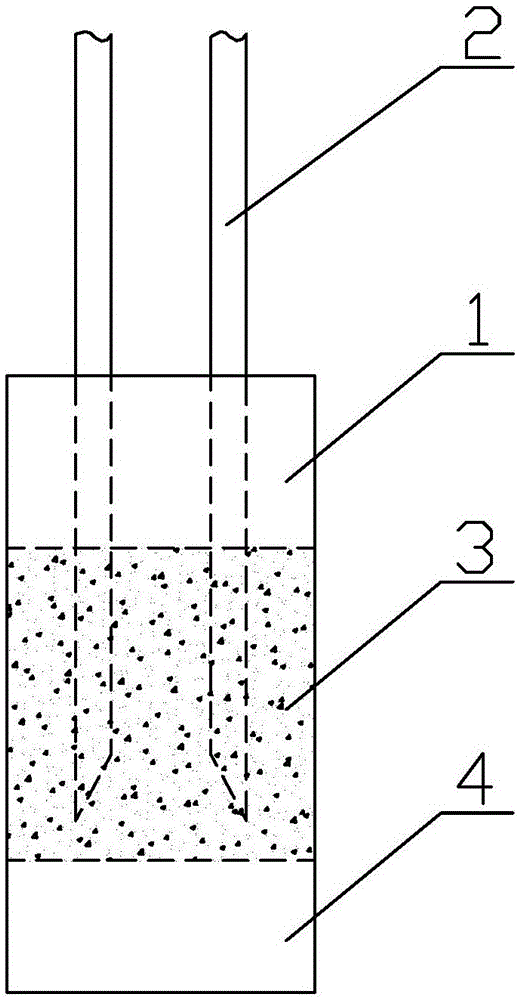A kind of preparation method of bi-2212 wire rod superconducting joint
A bi-2212, superconducting joint technology, applied in the direction of connection, line/collector parts, electrical components, etc., can solve the problems of overall performance degradation of wire strips, affecting the effect of superconducting joints, poor performance of superconducting joints, etc. , to achieve the effects of low manufacturing cost, improved connection, and high current-carrying performance
- Summary
- Abstract
- Description
- Claims
- Application Information
AI Technical Summary
Problems solved by technology
Method used
Image
Examples
Embodiment 1
[0031] Step 1. Use two Bi-2212 wires with a diameter of 1.25mm, clean the ends of the Bi-2212 wires to be connected, and then polish the cleaned ends with metallographic sandpaper, and finally form an inclination at the end of the Bi-2212 wires The polished surface; the angle between the polished surface and the length direction of the Bi-2212 wire is 30 degrees;
[0032] Step 2, placing the polished surface of the Bi-2212 wire rod polished and polished in step 1 in a corrosion solution for 20 minutes; the corrosion solution is made by uniformly mixing ammonia water, hydrogen peroxide and methanol according to a volume ratio of 30:10:100; In the corrosion process, control the length direction of the Bi-2212 wire rod to be perpendicular to the liquid surface of the corrosion solution, and the polished surface of the Bi-2212 wire rod is located below the liquid surface of the corrosion solution; the ammonia water, hydrogen peroxide and methanol are chemically pure reagents;
[0...
Embodiment 2
[0037]Step 1. Use two Bi-2212 wires with a diameter of 1.5mm, clean the ends of the Bi-2212 wires to be connected, and then polish the cleaned ends with metallographic sandpaper, and finally form a slope at the end of the Bi-2212 wires The polished surface; the angle between the polished surface and the length direction of the Bi-2212 wire is 40 degrees;
[0038] Step 2, placing the polished surface of the Bi-2212 wire rod polished in step 1 in a corrosion solution for 10 minutes; the corrosion solution is made by uniformly mixing ammonia water, hydrogen peroxide and methanol according to a volume ratio of 50:20:100; In the corrosion process, control the length direction of the Bi-2212 wire rod to be perpendicular to the liquid surface of the corrosion solution, and the polished surface of the Bi-2212 wire rod is located below the liquid surface of the corrosion solution; the ammonia water, hydrogen peroxide and methanol are chemically pure reagents;
[0039] Step three, such ...
Embodiment 3
[0043] Step 1. Use two Bi-2212 wires with a diameter of 0.8mm, clean the ends of the Bi-2212 wires to be connected, then polish the cleaned ends with metallographic sandpaper, and finally form a slope at the end of the Bi-2212 wires The polished surface; the angle between the polished surface and the length direction of the Bi-2212 wire is 30 degrees;
[0044] Step 2, placing the polished surface of the Bi-2212 wire rod polished in step 1 in a corrosion solution for 10 minutes; the corrosion solution is made by uniformly mixing ammonia water, hydrogen peroxide and methanol according to a volume ratio of 20:20:100; In the corrosion process, control the length direction of the Bi-2212 wire rod to be perpendicular to the liquid surface of the corrosion solution, and the polished surface of the Bi-2212 wire rod is located below the liquid surface of the corrosion solution; the ammonia water, hydrogen peroxide and methanol are chemically pure reagents;
[0045] Step three, such as ...
PUM
 Login to View More
Login to View More Abstract
Description
Claims
Application Information
 Login to View More
Login to View More - R&D
- Intellectual Property
- Life Sciences
- Materials
- Tech Scout
- Unparalleled Data Quality
- Higher Quality Content
- 60% Fewer Hallucinations
Browse by: Latest US Patents, China's latest patents, Technical Efficacy Thesaurus, Application Domain, Technology Topic, Popular Technical Reports.
© 2025 PatSnap. All rights reserved.Legal|Privacy policy|Modern Slavery Act Transparency Statement|Sitemap|About US| Contact US: help@patsnap.com

